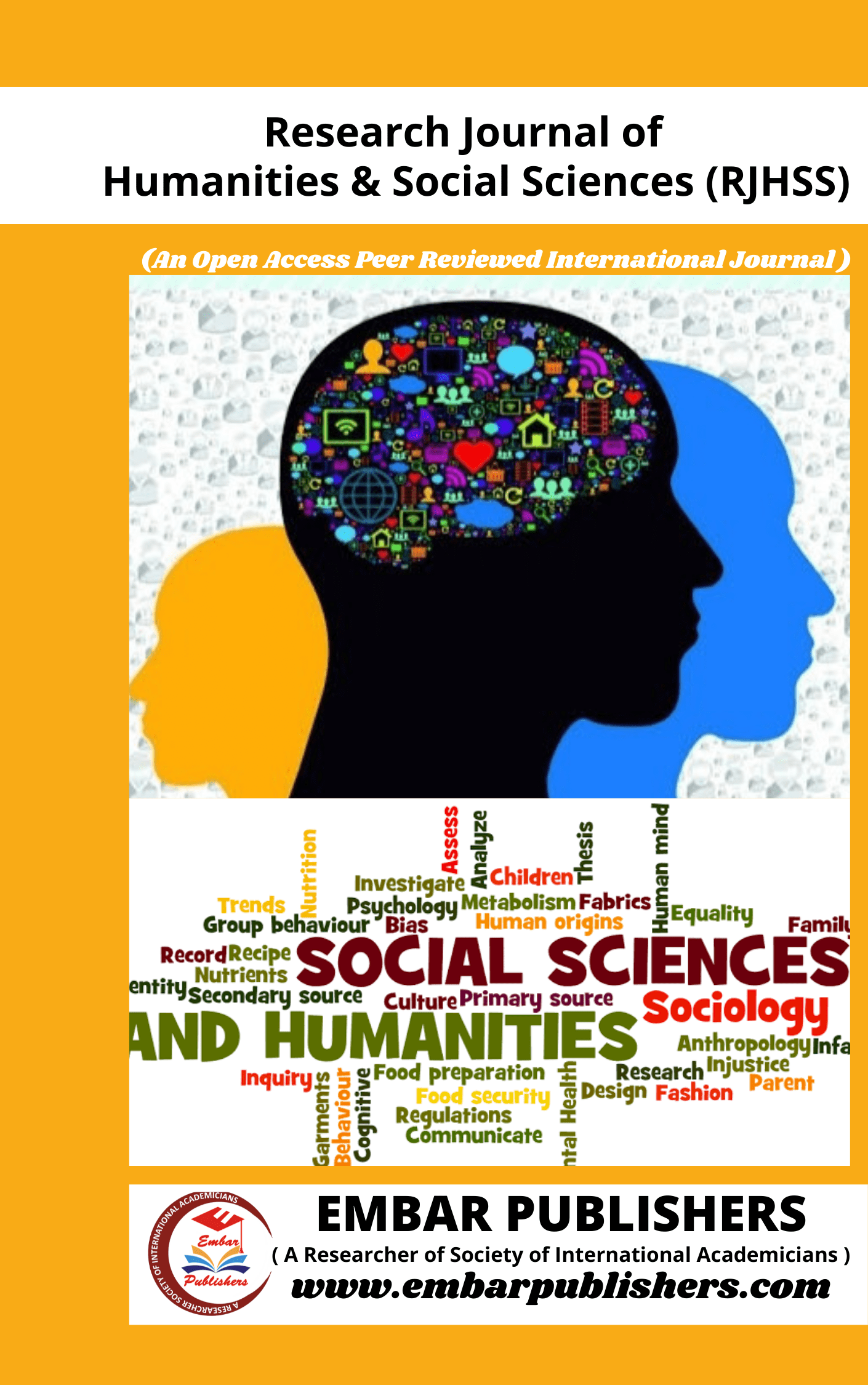
Path Analysis of Students’ Cognitive Style, Interest and Attitude on Their Academic Achievement in Biology in Nsukka Education Zones of Enugu State
Juliet Lebechi Ugwuekpe, Sunday Okechukwu Abonyi, 1Margaret Ndidiamaka Anugwo, Ann NnekaUgwuabo, Francis Elochukwu Ikeh*
Department of Science Education, Ebonyi State University Abakaliki , Department of Science Education, University of Nigeria, Nsukka
DOI: doi.org/10.58924/rjhss.v4.iss4.p15
Published Date: 19-Aug, 2025
Keywords: Keywords: Path Analysis, Cognitive Style, Interest, Attitude, Academic Achievement, Biology
Abstract:
Abstract: Using path analytic method, specifically the study established the path relationships Received: 05-08-2025 Revised: 08-08-2025 Accepted: 14-08-2025 Published: 19-08-2025 Copyright:© 2025 by the authors. Submitted for possible open access publication under the terms and conditions of the Creative Commons Attribution (CC BY) license (https://creativecommons.org/licenses/by/4.0/). amongst students’ cognitive style, interest, attitude and their academic achievement in Biology. Three research questions were raised and answered. The population of the study comprised 9367 Biology students in SS1-3 of 2018/2019 academic session. A sample of two hundred and forty-four (244) respondents comprising of both males and females was used. Data were collected using four instruments; Group Embedded Figure Test (GEFT), Biology Interest Scale (BIS), Biology Attitude Scale (BAS) and a proforma for collection of student academic achievement in biology. BIS and BAS were developed by the researcher and were appropriately validated by three Measurement and Evaluation experts from Department of Science Education from University of Nigeria Nsukka. Reliability coefficient of BIS and BAS were 0.88 and 0.78 respectively while that of GEFT was 0.82 as established by the author. Using the data collected research questions were answered using multiple regression analysis with Analysis of Moment Structure (AMOS) which is path analytic statistical software. Research question one and two were answered using the arrow headed lines in the path diagram, path coefficient and goodness of fit index and RMSEA. Research question three was answered using parameter estimate from IMB AMOS and percentage. The findings of the study showed that: the most meaningful causal model for providing explanation of the achievement of students in biology is recursive model involving FI cognitive style, FD cognitive style interest and attitude. FD cognitive style was included in the model because it has significant path with attitude; the significant path through which the independent variables caused variation in students’ achievement in Biology are those of field independent cognitive style and interest; FI and interest had direct significant path with achievement in biology. FI and FD cognitive style also had direct path relationship with attitude which is significant; and FI-Attitude-Interest had no significant indirect path with students’ achievement in biology, also in a total influence of 0.96 of the predictor variables (cognitive style interest and attitude) on the criterion variables (achievement) 72% was direct while 28% was indirect. It was recommended among others that parents, teachers, curriculum planners and all education stakeholders should reward students who show positive attitude to their studies in form of scholarship, award or prizes to encourage those who are really studying hard.
References:
1. Adegoke, B. A. (2011). Effect of indirect teacher influence on dependent prone student Learning outcome in secondary school mathematics.Journal of Education Psychology, 9(1), 238 – 308.
2. Adigwe, J. C. (2013). Influence of cognitive style, formal reasoning and gender on students’ achievement in chemical bonding. Review of Education Institute of Education Journal, University of Nigeria Nsukka.
3. Agatha MwendeKakui. Historical Background of Konza in Kenya: An In-Depth Exploration. Research Journal of Humanities and Social Sciences.2024 Jan 11,4(4):1-10 DOI :doi.org/10.58924/rjhss.v4.iss4.
4. Akobi, C (2014) Influence of parental socioeconomic status and home education environment on Students academic achievement using path analysis. M.Ed unpublished thesis University of Nigeria Nsukka.
5. BadamasiA.G(2015) Effect of two models of virtual field trips approach on students achievement and attitude to some environmental education concept. Unpublished Ph.D Thesis. University of Nigeria Nsukka
6. Singh S. Development of International Regimes for Child Rights.Res J Hum Soc Sci. 2025 Aug 06; 4(4):11-21. DOI: doi.org/10.58924/rjhss.v4.iss4.p2
7. Bingham O. (2018) Interest, meaning, types and measurement. Retrieved from www.psychologydiscussion.net
8. Chief Examiner Report (2018) www.waeconline.org.ng
9. Federal Ministry of Education (2009) Senior Secondary Education Curriculum Biology for SS1-3. Nigerian Education Research and Development Council Lagos NERDC press
10. Bhagirath Singh Negi. The Impact of Teacher Training on the Use of Digital Technologies in English Language Teaching and Learning.Research Journal of Humanities and Social Sciences.2024 Jan 11,4(1):1-9 , DOI:doi.org/10.58924/rjhss.v4.iss1.p3
11. Hooper, D., Coughlan, J., & Mullen, M. R. (2008). Structural equation modeling: Guidelines for determining model fit. Electronic Journal of Business Research Method,6(1). Retrieved from www.ejbrm.com.
12. Igbonagu I.B (2013) Effect of peer teaching on students’ achievement and interest in senior secondary school difficult chemistry concept.International journal of Education Research 2(2) pp 61-71
13. Iliyasu ,H,Lee,M.F&Yahaya K(2015) Attitude of secondary school students towards Biology as a school subject in BirninKebbi Metropolis Nigeria. International Journal of Research and Review 2(10)
14. Kpolovie, Joe &Okoto (2014) Academic achievement prediction: role of interest on learning and attitude towards school. International journal of Humanities, Social science and education 1(11) pp 73-100
15. Ricada, S, Anja,M, Weidinger,A.F&Wirthwein, L.S (2014) Academic achievement. Retrieved from www.oxfordbibliographies.comon 12th September 2018
16. Sakariyau, A. O., Taiwo, M. O., &Ajagbe, O. W. (2016).An investigation on secondary school students’ attitude towards science in Ogun State Nigeria.Journal of Education and Practice, 7(28), 2222-288x(online).
17. Sellah, R and Mondoh, H (2018) Predictive power of cognitive style on academic performance of students. http://www.tandfonline.com/doi /abs/ 10.1080/23311908.2018.1444908
18. Ugwugbo, A. N (2016) Effect of two modes of blended teaching approach on student achievement Retention and interest in Biology M.Ed Thesis University of Nigeria Nsukka
19. Ugwuanyi, S. C. (2016). Path analysis of teachers and students’ variables on secondary school Students achievement in physics.Unpublished Ph.D. Thesis University of Nigeria Nsukka.
20. Wagbara, S. O. (2015). Influence of cognitive style on secondary school students interest and acquisition of practice skill in chemistry. Unpublished Ph.D Thesis University Of Nigeria Nsukka.

ISSN(Online): 2945-3968
Publisher: Embar Publishers
Frequency: Bi-Monthly
Chief Editor: Dr N.L.N Jayanthi
Language: English
